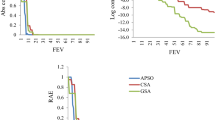Abstract
Global constraints provide strong filtering algorithms to reduce the search space when solving large combinatorial problems. In this paper we propose to make the global constraints dynamic, i.e., to allow extending the set of constrained variables during search. We describe a generic dynamisation technique for an arbitrary monotonic global constraint and we compare it with the semantic-based dynamisation for the alldifferent constraint. At the end we sketch a dynamisation technique for non-monotonic global constraints. A comparison with existing methods to model dynamic problems is given as well.
Similar content being viewed by others
References
R. Barták, Dynamic constraint models for planning and scheduling problems, in: New Trends in Constraints, Lecture Notes in Artificial Intelligence, Vol. 1865 (Springer, Berlin, 2000) pp. 237–255.
R. Barták, Dynamic global constraints: a first view, in: Proceedings of the CP-AI-OR 2001 Workshop (2001) pp. 39–49.
N. Beldiceanu, Global constraints as graph properties on a structured network of elementary constraint of the same type, in: Proceedings of Principles and Practice of Constraint Programming (CP2000) (2000) pp. 52–66.
N. Beldiceanu and E. Contejean, Introducing global constraints in CHIP, Mathematical and Computer Modelling 12 (1994) 97–123.
Ch. Bessiere, Non-binary constraints, in: Proceedings of Principles and Practice of Constraint Programming (CP99) (1999) pp. 24–27.
Ch. Bessiere and J.-Ch. Régin, Enforcing arc consistency on global constraints by solving subproblems on the fly, in: Proceedings of Principles and Practice of Constraint Programming (CP99) (1999) pp. 103–117.
M. Carlsson, G. Ottosson and B. Carlsson, An open-ended finite domain constraint solver, in: Proceedings of the Conference on Programming Languages: Implementations, Logics, and Programs (1997).
F. Fages, J. Fowler and T. Sola, A reactive constraint logic programming scheme, in: Proceedings of the International Conference on Logic Programming (1995) pp. 149–163.
I. Gent, K. Stergiou and T. Walsh, Decomposable constraints, Artificial Intelligence 123(1–2) (2000) 133–156.
P. Laborie, Algorithms for propagating resource constraints in AI planning and scheduling: existing approaches and new results, in: Proceedings of the European Conference on Planning (ECP-01) (2001).
C. Le Pape, Implementation of resource constraints in ILOG schedule: a library for the development of constraint-based scheduling systems, Intelligent Systems Engineering 3(2) (1994) 55–66.
S. Mittal and B. Falkemhainer, Dynamic constraint satisfaction problems, in: Proceedings of AAAI-90 (1990) pp. 25–32.
A. Nareyek, Structural constraint satisfaction, in: Proceedings of AAAI-99 Workshop on Configuration (1999).
A. Nareyek, AI planning in a constraint programming framework, in: Proceedings of the Third International Workshop on Communication-Based Systems (2000).
M. Pegman, Short term liquid metal scheduling, in: Proceedings of the Conference on Practical Application of Constraint Technology (1998) pp. 91–100.
J.-Ch. Régin, A filtering algorithm for constraints of difference in CSPs, in: Proceedings of AAAI-94 (1994) pp. 362–367.
J.-Ch. Régin, Generalised arc consistency for global cardinality constraint, in: Proceedings of AAAI-96 (1996) pp. 209–215.
F. Rossi, V. Dahr and C. Petrie, On the equivalence of constraint satisfaction problems, in: Proceedings of 9th European Conference on Artificial Intelligence (1990) pp. 550–556.
H. Simonis, Trends in finite domain constraint programming, in: Proceedings of Workshop on Constraint Programming for Decision and Control (CPDC '99) (1999).
A.S.J. Van Der Linden, Dynamic meta-constraints: an approach to dealing with non-standard constraint satisfaction problems, PhD Thesis, Oxford Brookes University (2000).
P. Van Hentenryck, Incremental constraint satisfaction in logic programming, in: Proceedings of the International Conference on Logic Programming (1990) pp. 189–202.
P. Van Hentenryck and Y. Deville, The cardinality operator: a new logical connective for constraint logic programming, in: Proceedings of the International Conference on Logic Programming (1991) pp. 745–759.
Author information
Authors and Affiliations
Rights and permissions
About this article
Cite this article
Barták, R. Dynamic Global Constraints in Backtracking Based Environments. Annals of Operations Research 118, 101–119 (2003). https://doi.org/10.1023/A:1021805623454
Issue Date:
DOI: https://doi.org/10.1023/A:1021805623454




